Feminists In Focus
December 5, 2012 by Amy Stone
‘Fill the Void’ with Hasidic Dream Men
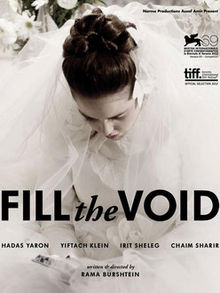 Park your Jewish feminist preconceptions at the door of this Israeli “insider film” on life within the world of Tel Aviv Hasidim.
Park your Jewish feminist preconceptions at the door of this Israeli “insider film” on life within the world of Tel Aviv Hasidim.
“Fill the Void” (“Lemale et ha’Chalal”) made its U.S. premiere in October at the 50th New York Film Festival, following its world premiere at the Venice Film Festival, where lead actress Hadas Yaron received Best Actress award. This is the story of a young Hasidic woman pressured to marry her brother-in-law after her sister dies in childbirth.
Don’t expect the bitter tale of a teen-ager whose dreams and youth are sacrificed to an ultra-Orthodox society in need of childcare. This first feature film written and directed by 45-year-old Rama Burshtein, a happily Hasidic New York-born Israeli, is gentle, sweet and totally self-contained. The outside world remains outside the close-knit community of well-dressed Hassids with international connections. Clothed in the time warp of a vanished East European Jewry, the men wear white knee socks, silken holiday robes that anywhere else would be luxe bathrobes, and shtreimels (fur hats) the size of lampshades. The wives cover their heads with stylish turbans – silk wrappings in faux leopard prints. But the feeling is anything but antique; this is an observant way of life that’s alive and well.
- 1 Comment
June 25, 2012 by Amy Stone
Feminists in Focus: Faigele Film Festival Kvels Over ‘DevOUT’
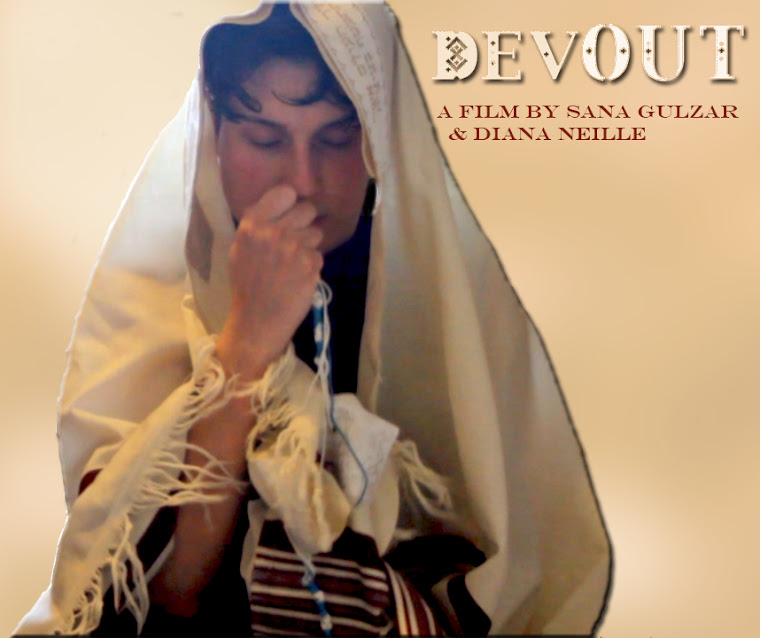 Thank God the Jews don’t have a pope.
Thank God the Jews don’t have a pope.
While the Vatican is denouncing Sister Margaret Farley’s “Just Love: a Framework for Christian Sexual Ethics” with its defense of same-sex marriage, the JCC in Manhattan is celebrating all things LGBTQ-Jew with its month-long Gay Paree. The June festivities started with the Seventh Annual Faigele Film Festival (a one-night stand of two films). Not just a JCC thing, Conservative Judaism promulgated wording for same-sex marriage ceremonies – and divorces – in time for June weddings and Gay Pride Day.
But in Orthodox communities don’t expect any openly passionate same-sex hand holding on either side of the mechitzah.
Quick cut to the Faigele Film Festival’s screening of “DevOUT,” the 37-minute video where lesbian Orthodox Jews explain why they want to be true to both their faith and their sexuality. Proof that sisterhood is powerful, the video was made by two straight women, neither of them Jewish. One Christian, one Muslim, Diana Neille from South Africa and Sana Gulzar from Pakistan won the trust of the women involved to produce the video as their 2011 Columbia Journalism School master’s project. They were quick studies. The soundtrack includes sinuously sensual klezmer music from New York’s Isle of Klezbos sextet.
- 1 Comment
February 10, 2012 by Amy Stone
Feminists in Focus: Yes, There’s Room for More Films on the Holocaust
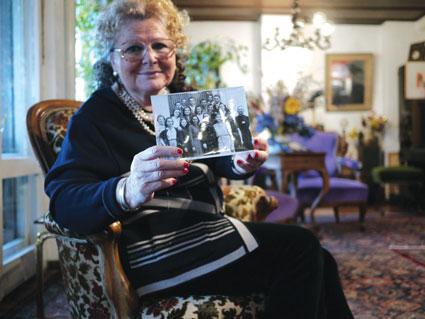
Three Promises
(The New York Jewish Film Festival, presented by The Jewish Museum and the Film Society of Lincoln Center, ended Jan. 26. Look for these films at other festivals and, hopefully, in commercial distribution.)
“Three Promises”
Charm is not a word usually associated with Holocaust remembrances, but take a look at “Three Promises,” the Serbian short with English subtitles that had its world premiere at the New York Jewish Film Festival. It tells the story of Serbian Jewry through beautifully animated collages of black and white photographs from one family’s album. The album survived the Nazis. Most of the family, like almost all of Belgrade’s 10,000 Jews, did not.
The album brings them back to life. It’s a valentine to the past, combined with the horrors.
Almost overloaded with Belgrade’s Sephardic Jewish history, the script by Edward Serotta tells the love story that triggered “Three Promises”: the promise a wife made to her husband to protect their daughters, the promise a priest made to this woman to hide the girls, and the promise one of the daughters made to herself that the priest would be recognized as a Righteous Gentile.
The love story is extraordinary. A Slovene Catholic woman visiting relatives in Belgrade falls in love with a man who is Jewish and crippled. She embraces not only him but his family and his religion. Years later, thanks to a Slovene priest in Belgrade, their two daughters survive to tell the tale.
- No Comments
February 6, 2012 by Naomi Danis
Feminists in Focus: In Darkness on the Shortlist
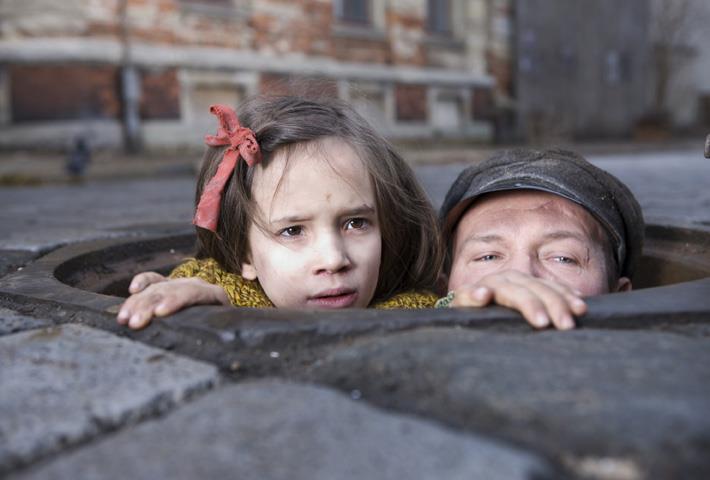 In Darkness, a film by Polish director Agnieszka Holland (Europa, Europa), is based on the true story of Leopold Socha (Robert Wieckiewicz), a Catholic sewer worker and petty thief who, though not especially fond of Jews, is willing to court danger in 1943 Nazi-occupied Lvov in order to make some easy cash, and hides a group of Jews underground for over a year.
In Darkness, a film by Polish director Agnieszka Holland (Europa, Europa), is based on the true story of Leopold Socha (Robert Wieckiewicz), a Catholic sewer worker and petty thief who, though not especially fond of Jews, is willing to court danger in 1943 Nazi-occupied Lvov in order to make some easy cash, and hides a group of Jews underground for over a year.
Jolanta Dylewska’s startlingly beautiful color cinematography lends a heartbreaking immediacy and vividness to all the lives depicted, and the film’s photographic feat creates a powerful contrast between the above ground light and the underground darkness, conveying more than a metaphorical moral gravitas. Shot in Polish, Ukrainian, Russian, German, Yiddish and even a little Hebrew–all with English subtitles–the film feels thankfully un-Hollywood, and it depicts a humanity replete with kindness and selfishness, cruelty and courage,fortitude and desperation, hope and goodness, with the Jewish characters, too, shown in all their human frailty.
There were moments in the film when I wanted to cover my eyes, like one of the characters who covered her own eyes and her daughter’s, but however troubling and terror-filled, this compelling film tells an important story we may never understand, but ignore at our peril. As the director noted, it continues to echo in different places in the world, from Rwanda to Bosnia.
- No Comments
February 1, 2012 by Amy Stone
Reporting back from the New York Jewish Film Festival: But would you go there? ‘Welcome to Kutsher’s: The Last Catskills Resort’
(The New York Jewish Film Festival, presented by The Jewish Museum and the Film Society of Lincoln Center,ended Jan. 26. Look for these films at other festivals and, hopefully, in commercial distribution.)
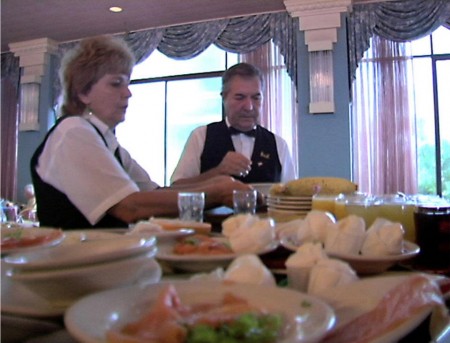 What does it say about the state of American Judaism that the New York Jewish Film Festival’s final offering was the documentary “Welcome to Kutsher’s: The Last Catskills Resort”? Sad to say, we are talking the resort of last resort.
What does it say about the state of American Judaism that the New York Jewish Film Festival’s final offering was the documentary “Welcome to Kutsher’s: The Last Catskills Resort”? Sad to say, we are talking the resort of last resort.
The Kutsher’s story testifies to the drive and determination that made Kutsher’s a piece of Jewish Americana for more than a century. This is the tale of three generations of Kutshers who oversaw the rise and watched the demise of the resort formula they perfected. Three meals a day – all the kosher food you could eat; free, top-flight entertainment; fun for the whole family; and the Kutsher niche – famous athletes on staff.
There was plenty of room for strong women in the Kutsher family. In 1907, Louis and Max Kutsher and Max’s wife, Rebecca, had saved enough money as tailors on the Lower East Side to buy farmland in Sullivan County in upstate New York. Like other Jewish farmers, they took in boarders from the Lower East Side. When guests turned out to be more profitable than chickens and cows, the Jewish resort business was born, responding to working-class Jews finally able to afford vacations but barred from gentile-only resorts.
- No Comments
January 30, 2012 by Amy Stone
Reporting back from the New York Jewish Film Festival: Recreating the Past – Incessant Visions: Letters From an Architect
(The New York Jewish Film Festival, presented by The Jewish Museum and the Film Society of Lincoln Center, at www.thejewishmuseum.org/
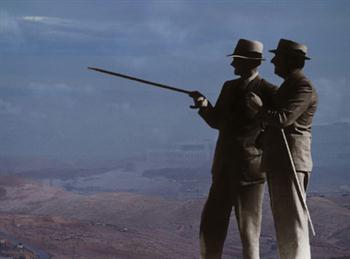 Tiny sketches sent by a young Jewish architect from the German-Russian front in World War I to woo a beautiful 16-year-old cellist in Berlin paid off.
Tiny sketches sent by a young Jewish architect from the German-Russian front in World War I to woo a beautiful 16-year-old cellist in Berlin paid off.
Erich Mendelsohn, a visionary architect whose curvaceous organic sketches could have grown into Frank Lloyd Wright’s Guggenheim Museum, won the hand of Louise Maas. Growing up in a wealthy German Jewish merchant family and studying cello at the Royal Conservatory in Berlin, she defied her father. At 21, she married the poor Jewish architect from East Prussia.
But it worked. Thanks to his talent and her connections, Mendelsohn became the most sought after architect in Berlin – until commissions dried up and they fled the Nazis.
His monumental works have mostly vanished from the earth – bombed by Allied forces – but Erich Mendelsohn and his beloved Louise are brought back to life in Israeli filmmaker Duki Dror’s “Incessant Visions: Letters From an Architect.”
- No Comments
January 24, 2012 by Amy Stone
Feminists in Focus: Reporting back from the New York Jewish Film Festival Mission Accomplished for ‘Bottle in the Gaza Sea’
(Check the calendar for the festival, presented by The Jewish Museum and the Film Society of Lincoln Center, at www.thejewishmuseum.org/
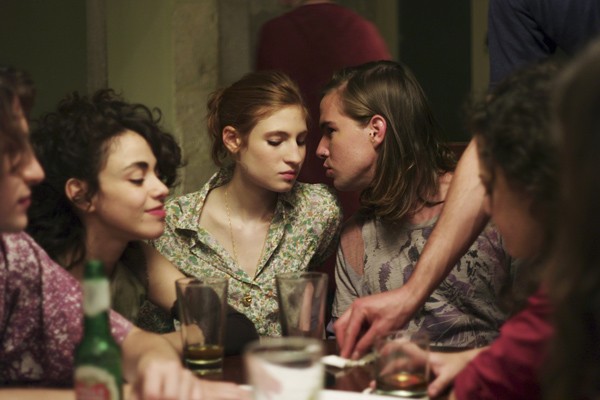 What a coup for the most political film at this year’s NY Jewish Film Festival – “A Bottle in the Gaza Sea” — to make its world premiere at the festival. And how encouraging to see that fresh and touching ground remains to communicate the message that the bloodshed between Israelis and Palestinians is too inhuman to continue.
What a coup for the most political film at this year’s NY Jewish Film Festival – “A Bottle in the Gaza Sea” — to make its world premiere at the festival. And how encouraging to see that fresh and touching ground remains to communicate the message that the bloodshed between Israelis and Palestinians is too inhuman to continue.
Tal, a teen whose family has moved from France to Jerusalem, slips a message into a bottle saying that she refuses to accept that only hatred can exist between Israelis and Palestinians. She gets her brother to throw the bottle into the ocean while he’s on army duty near Gaza. An e-mail response to “bottleaccess” eventually comes from “Gazaman.”
The resulting e-mails become poignant when terrorist attacks in Jerusalem are met with Israeli air strikes in Gaza.
The film is based on the award-winning novel of the same name by French writer Valérie Zenatti, who spent her teen years in Israel. (Her earlier book, “When I Was a Soldier,” about her life in the Israeli army, was reviewed in Lilith.)
- No Comments
January 20, 2012 by Amy Stone
Feminists in Focus: Reporting back from the New York Jewish Film Festival Peeling Away the Layers of ‘Restoration’
(Check the calendar for the New York Jewish Film Festival, presented by The Jewish Museum and the Film Society of Lincoln Center, at www.thejewishmuseum.org/
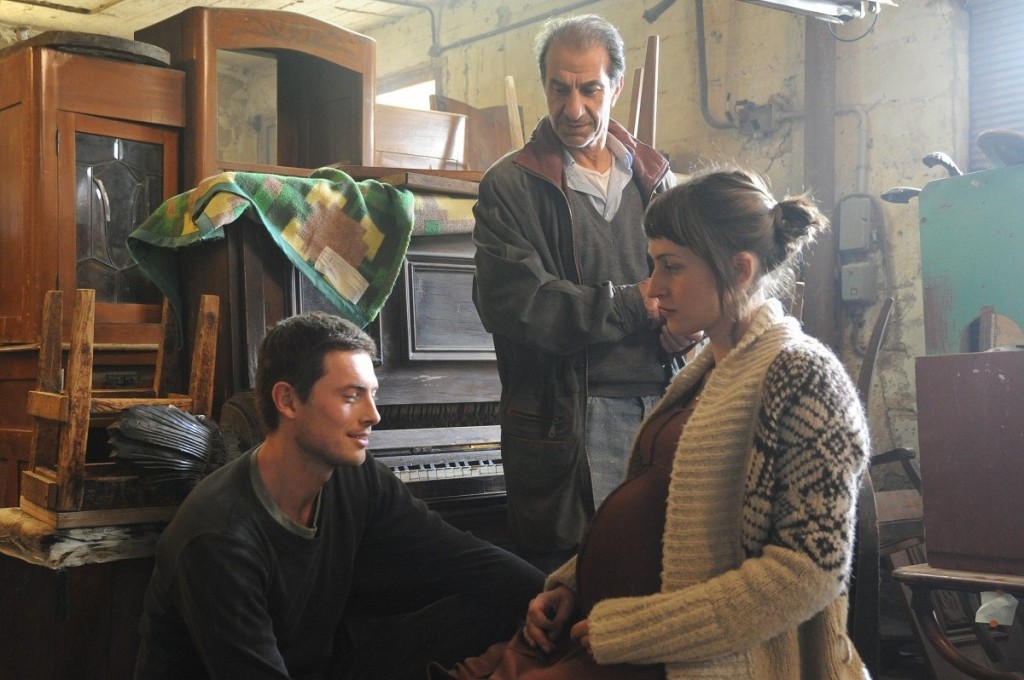 Finely crafted is the operative phrase for “Restoration.” The 2010 Israeli film (English subtitles) directed by Joseph Madmony tells the tale of Fidelman, an aging restorer of antique furniture stubbornly trying to hang onto his business. Starring Sasson Gabai (“The Band’s Visit”), “Restoration” unfolds with exquisite twists and turns that won it the Dramatic Screenwriting Award at this year’s Sundance Film Festival and several prizes at the Jerusalem Film Festival. (Madmony collaborated with Erez Kav-El on the script.)
Finely crafted is the operative phrase for “Restoration.” The 2010 Israeli film (English subtitles) directed by Joseph Madmony tells the tale of Fidelman, an aging restorer of antique furniture stubbornly trying to hang onto his business. Starring Sasson Gabai (“The Band’s Visit”), “Restoration” unfolds with exquisite twists and turns that won it the Dramatic Screenwriting Award at this year’s Sundance Film Festival and several prizes at the Jerusalem Film Festival. (Madmony collaborated with Erez Kav-El on the script.)
Set in a timeless corner of Tel Aviv, it takes cell phones and a digital camera with video option to make clear we’re in the present.
Enter Anton (Henry David), the mysterious drifter who becomes Fidelman’s assistant. Add Fidelman’s estranged son, Noah (Nevo Kimchi), and his very pregnant wife, Hava (Sarah Adler). And there’s the impact beyond the grave of his freshly deceased partner, Malamud, who managed the shop’s finances.
- No Comments
January 20, 2012 by Amy Stone
Feminists in Focus: 21st Annual NY Jewish Film Festival Opens With ‘Flood’
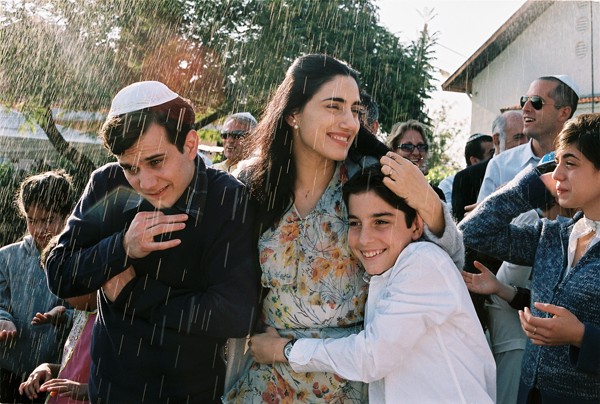 You can’t accuse the New York Jewish Film Festival of being a front for Zionist propaganda, especially with the festival opener “Mabul” (The Flood).
You can’t accuse the New York Jewish Film Festival of being a front for Zionist propaganda, especially with the festival opener “Mabul” (The Flood).
(Check the calendar for the festival, presented by The Jewish Museum and the Film Society of Lincoln Center, at www.thejewishmuseum.org/
The Israeli-Canadian-French co-production, in Hebrew with English subtitles, could well be a film for the Manhattan JCC’s Other Israel film festival, with tales of the unhappy side of the Jewish State. There’s Yoni, the young bar mitzvah boy, earning money doing homework for the school bullies; his non-functioning pot-smoking crop pilot father; his gorgeous mom – a Mediterranean beauty – sweetly running a nursery school but screwing one of her young charges’ parents; and, if that weren’t enough, Tomer, the older brother, autistic to the point of needing constant care, back with the non-functional family when his institution goes bankrupt.
Welcome to life in the modern Jewish State. Who knew that an Israeli institution caring for the severely disabled could go bust. What a touch that the film’s one handsome Zionist-dream male is a philanderer. And that male-female roles remain entrenched unto the next generation, with the bar mitzvah boy berating his stressed-out mom for not taking adequate care of his disabled brother.
- No Comments
November 15, 2011 by Naomi Danis
Feminists in Focus: Dolphin Boy
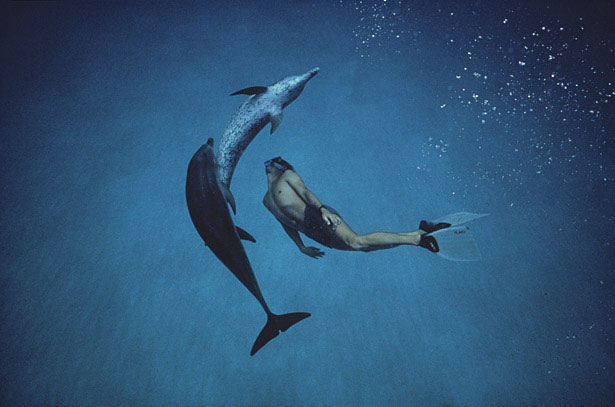 I am an Israeli film junkie. Even though I visit my beloved other country often, I also depend on and delight in getting extra fixes of Israel vicariously through its films.
I am an Israeli film junkie. Even though I visit my beloved other country often, I also depend on and delight in getting extra fixes of Israel vicariously through its films.
When Meir Fenigstein’s Israel film festival comes to New York, for 25 years already, I am there. Each year, no matter how late the schedule is published, the theater always fills up. My theory is that we are a traumatized people, Israelis, and Jews, and that any time someone is retelling our story with imagination and courage, giving us a new narrative of familiar and often painful experiences, we want to hear and see what they have to say. We show up.
On Thursday night I wouldn’t have missed the opening of the 5th annual Other Israel Film Festival. This festival of films by and about Israel’s minority communities and especially the Arab citizens of Israel, is always provocative, sobering, bittersweetly entertaining–and if sometimes disheartening in its exposure of deeply felt injustices–always hope-inspiring because of the very fact of the festival’s existence.
The opening film this year, “Dolphin Boy,” a feature length documentary, is narrated in English (with subtitles for the Hebrew and Arabic) by an Israeli Jewish psychiatrist telling the story of his patient, a 17-year-old Palestinian Israeli young man, who is brought to him after a traumatic beating at the hands of other young men from his village avenging what they misconstrued as an “honor” violation. The film covers a period of four years of healing, and is a story about vulnerability and love, about relationships, between doctor and patient, father and son, boy and dolphins. This documentary like the arenas it portrays, medical treatment and nature, transcends politics.
- 1 Comment
 Please wait...
Please wait...